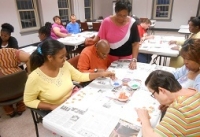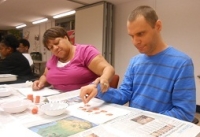Sensory Storytime for Special Needs Adults
Durham County Library, N.C.
Innovation Synopsis
Challenge/Opportunity
There are limited opportunities for individuals with special needs in most communities in the United States. Few library programs specifically focus on this population. In public libraries, storytimes are offered to children of all ages. They’re designed to meet a number of needs, including but not limited to, entertainment, development of comprehension and literacy skills, introduction to multiculturalism, early advocacy for reading and improvement of social skills. The library also offers diverse programs for adults that include many of these same categories. Yet there are few programs specifically for individuals with special needs, despite a need for these services. Sensory Storytime was created to provide special needs adults with an opportunity to experience the same benefits of storytime, crafts, music and dance that other populations take for granted. This is an environment that otherwise would be closed to them. Sensory Storytime makes storytimes come alive for special needs adults in ways they can touch, taste, see, smell and hear. Using old favorites as well as new stories, repetitive rhymes, and interactive call and response in both reading and music, these adults are able to further develop their comprehension and literacy skills, as well as refining social skills through interaction with their peers, library staff and other patrons.
Key Elements of Innovation
Sensory Storytime is for adults with special needs. This weekly program, started in May 2012, provides special needs adults with age appropriate, multi-modal learning and literacy opportunities that refine and develop sensory processing skills needed in everyday life. Program attendees consist of an adult day care group and individuals from the community. Attendance averages nine to eighteen special needs adults. Most attendees have caregivers who assist during crafts and activities, allowing the librarian to provide equal attention and assistance. Consistent weekly features provide the familiarity and routine that is critical for this population. The program uses music, interactive reading of books with colorful pictures, storytelling, dancing, crafts and activities that stimulate the senses. A picture schedule illustrates the order of events so that the attendees know what to expect. Selecting activities for adults can require more preparation than storytimes for children. Many special needs adults suffer from sensory dysfunction – a condition where the brain is unable to process or organize sensory information in an appropriate or effective manner. To refine and develop sensory processing skills, program activities focus on auditory, visual and tactile learning. Activities must be complex enough to engage and challenge adults, but be flexible enough for a variety of ability levels. The need to provide for a diverse population led to the creation of a storytime for adults with special needs, but careful observation of the particular needs of this population led to the evolution from simple storytime to a storytime that utilizes sensory activities. Librarians skilled in the art of storytimes tailored for niche populations would have no trouble replicating this much needed program in their own communities.
Achieved Outcomes
Initially, Sensory Storytime was created simply to provide an hour of activity outside of the group home. With experience and a better understanding of the needs of this population, Sensory Storytime has developed far beyond simple entertainment. Participants work on social skills, practice making choices that lead to a visible outcome and experience new activities that push them outside of their comfort zones. Initially, the program served seven to nine adults, but those numbers have increased dramatically. There is a great likelihood of adding a second storytime to accommodate increased interest from the community. Lessons Learned: Programs that incorporate movement, music and dancing are most popular. Routine is key. When storytimes have had to be cancelled, the following program required additional time and effort to re-establish the routine. Relationship building and laughter have transformed quiet, reserved attendees, hesitant to try new activities into adults who thrive and regularly practice those skills needed to function. Constant communication with attendees, caregivers and family members provides feedback on how to improve the program, as well as assessment of the sensory activities. A survey was conducted to gather information about the program. Results were very positive, indicating a continued demand for the program, areas for desired continued improvement, and areas of success. Outreach to the community also indicated a need for services for children with special needs as well. A similar Sensory Storytime for children will begin this summer at six Durham County Library locations. With continued success, the programs will be offered year-round.



